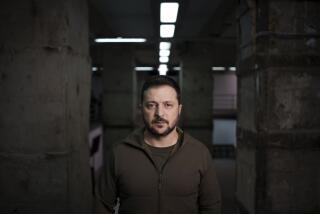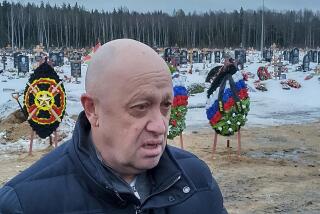Policy Meeting Aimed Attacks at Gorbachev
- Share via
MOSCOW — When Soviet President Mikhail S. Gorbachev ousted a quarter of the members of the Communist Party’s policy-making Central Committee this week, he appeared to have won another of his stunning political victories, removing many of his critics from the party leadership and replacing them with supporters.
When his strong reaffirmation of thorough-going reforms was published after the meeting, he seemed, from the initial reading, to be putting the country on a course of rapid and more radical change and committing the party to break out of the present stalemate between reformers and conservatives.
But when the full debates of the Central Committee meeting were published Thursday, Gorbachev appeared surprisingly beleaguered, under attack from the right and the left within the committee, criticized both for his policies and his style of leadership and winning only two half-hearted endorsements from presumed supporters.
Such are the complexities--and the very sharp divisions--of current Soviet politics.
Gorbachev’s mastery of the deft, swift Kremlin maneuvering, all of it behind the scenes, that is necessary to hold power here was clear at the Central Committee meeting, and Gorbachev’s political skills on this level are unrivaled today.
Over the past year, he had already realigned the ruling Politburo, bringing in supporters and easing critics to the sidelines. He had led the party through a soul-searching conference last summer to win broader agreement on the scope of the needed reforms. And he had brought in a new parliamentary system and last month put the country through its first contested elections since the earliest days of the Soviet state, receiving a strong popular mandate.
This is important for Gorbachev because it secures his flanks from attack, particularly by party conservatives concerned about his flouting of political orthodoxy. The recent changes in the Politburo and Central Committee, moreover, help ensure that he is not ousted, as was Nikita S. Khrushchev, another reformer, by a conservative party coup.
But little of Gorbachev’s political strength has translated into direct, tangible change--the improved living standards that people expect, the takeoff in economic development that Gorbachev’s advisers had predicted, the “modern socialism” that he himself had spoken of.
And the reason, long suspected but never so clear, was evident in the sustained attacks on the reforms by the Central Committee members who spoke at the closed-door Kremlin meeting on Tuesday.
There, all the doubts, the misgivings, the fears, the anger spilled out as 20 speakers took the floor to endorse the retirement of 110 members and nonvoting members of the party Central Committee and the Central Auditing Commission, a watchdog body, and then to appraise, sometimes in almost tragic terms, the present state of the party and country.
“Gorbachev dominates but does not control the Central Committee members,” said a senior Soviet journalist who has close contacts with the leadership. “This means that he can move them around, even beat up on them, but he cannot necessarily make them do what he wants.”
Even the purge of most of the conservative rump of the Central Committee, the political leftovers from the “era of stagnation” under President Leonid I. Brezhnev and those already moved out of top positions within the party and the government, does not guarantee immediate or enthusiastic implementation of Gorbachev’s reforms.
While he can command enough support within the Central Committee for proposals he puts before it, Soviet sources said, he has no way, short of a massive purge, of ensuring their implementation.
And a major reason, perhaps the principal one, lies in the conservative character of the Central Committee, most of whose members, now 251, are longtime members of the party, government or military bureaucracy and identify with its interests.
One speaker after another at the committee meeting criticized the scope, the speed and the implementation of Gorbachev’s reform program, known as perestroika. The need for reform was not disputed, but the way that Gorbachev was implementing change was sharply criticized.
“Today, people do not have confidence in tomorrow,” Vladimir I. Melnikov, the outspoken party leader from the Komi region in northern Russia, bluntly told the meeting, blaming poor implementation of the reforms.
Moscow Mayor Valery T. Saikin, who lost in the parliamentary elections when he was unable to defeat a challenge from the forewoman of a team of house painters, said, “The people feel uncomfortable, alarmed, and have lost their optimism.”
The country’s mass media, suddenly alive with criticism, exposes and provocative new ideas under Gorbachev’s policy of glasnost, or openness, after more than 50 years of deadly direct government censorship, were repeatedly attacked for going too far, for abusing their new freedom, for causing people to question government policies and doubt the party’s leadership.
The intelligentsia, whose early support was critical for Gorbachev in breaking with past policies, was accused of propelling the country into changes that had not been fully thought out, that so far had created many more problems than they had solved and that suited them but not the working class.
Last month’s parliamentary elections, a key Gorbachev reform, had been foisted upon the country, the critics charged, as the road to democracy; yet the results--meaning the extensive losses by party officials, even when unopposed--proved that they were against the party’s interests and undermined its authority.
“The minuses here significantly exceed the pluses,” Yuri F. Solovyev, the Leningrad party leader and a candidate, or nonvoting, member of the Politburo, said, perhaps reflecting as much on his defeat in the elections, although he was unopposed, as on the political reforms in general.
Cooperative businesses, an important if only an initial step toward a mixed economy advocated by Gorbachev, were characterized as legalized “speculation” because of their readiness to charge whatever price the market will bear and to pay whatever price was required to obtain materials, equipment and skilled labor in competition with state enterprises.
New legislation, which will not only implement the reforms but which will be the foundation of a shift toward what Gorbachev calls a “law-governed country,” was harshly criticized as unworkable half-measures. A strong preference was evident for continuation of the old system in which the government was based largely on party decisions, elaborated by occasional decrees of the leadership and administrative regulations promulgated by the bureaucracy.
On ideological issues, many serious questions--issues that involve the country’s basic political orientation--had arisen for which party officials complained they had no answers because of drift within the top leadership.
“Various generations of people, separate social lawyers and even regions are quarreling among themselves,” Saikin said, adding that the popular loss of faith in the party was such that it no longer exercised its “vanguard role.”
The Central Committee Secretariat, which Gorbachev has reduced in size and restaffed with his own people, was denounced repeatedly for its alleged isolated from the people, its orientation toward intellectuals rather than the working class and its theoretical approach to problems.
And Gorbachev’s own political conduct as the party leader was criticized as well. He had become isolated from the people, the outspoken Melnikov said, and the Secretariat was “protecting him from the severity of the situation that exists down below.”
On and on, the criticism rolled--the speeches filled seven full pages of the Communist Party newspaper Pravda on Thursday--as Gorbachev and his opponents on the Central Committee compressed into a day the sharpening struggle over the future of the country.
Delivering one of his most brilliant expositions of perestroika at the end, Gorbachev not only defended the need for reform but also challenged critics to stop looking through “yesterday’s eyes.”
“I do not agree with the extreme judgments that the party is nearly losing its position in the country or that it has turned into a debating society,” he said. “The party’s dialogue with working people is not a weakness, nor is it making the party a debating society. If it is weakness to conduct a dialogue with all segments of society, then I do not know what courage is.”
More to Read
Sign up for Essential California
The most important California stories and recommendations in your inbox every morning.
You may occasionally receive promotional content from the Los Angeles Times.













